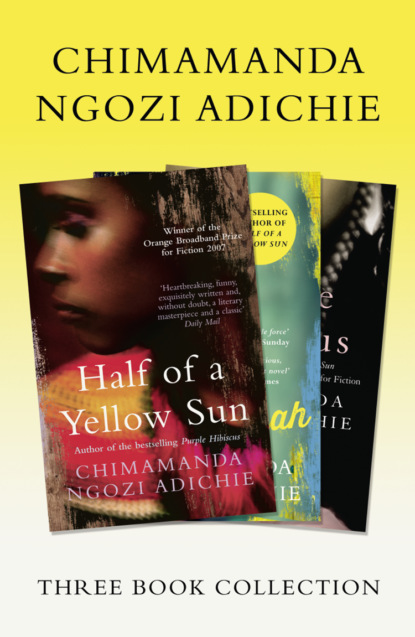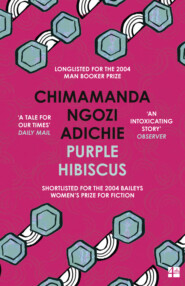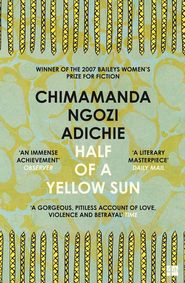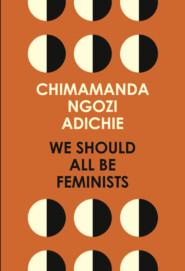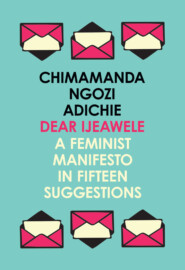По всем вопросам обращайтесь на: info@litportal.ru
(©) 2003-2024.
✖
Half of a Yellow Sun, Americanah, Purple Hibiscus: Chimamanda Ngozi Adichie Three-Book Collection
Автор
Год написания книги
2018
Настройки чтения
Размер шрифта
Высота строк
Поля
She looked at him. ‘We are fine as we are.’
‘We are at war and my mother would have to decide what will be done with my body if anything happened to me. You should decide that.’
‘Stop it, nothing will happen to you.’
‘Of course nothing will happen to me. I just want you to marry me. We really should marry. It no longer makes sense. It never made sense.’
Olanna watched a wasp flit around the spongy nest lodged in the wall corner. It had made sense to her, the decision not to marry, the need to preserve what they had by wrapping it in a shawl of difference. But the old framework that fit her ideals was gone now that Arize and Aunty Ifeka and Uncle Mbaezi would always be frozen faces in her album. Now that bullets were falling in Nsukka. ‘You have to take wine to my father, then,’ she said.
‘Is that a yes?’
A bat swooped down and Olanna lowered her head. ‘Yes. It is a yes,’ she said.
In the morning, she heard the town crier walking past the house, beating a loud ogene. ‘There will be a meeting of all Abba tomorrow at four p.m. in Amaeze Square!’ Gom-gom-gom. ‘There will be a meeting of all Abba tomorrow at four p.m. in Amaeze Square!’ Gom-gom-gom. ‘Abba has said that every man and every woman must attend!’ Gom-gom-gom. ‘If you do not attend, Abba will fine you!’
‘I wonder how steep the fines are,’ Olanna said, watching Odenigbo dress. He shrugged. He had only the two shirts and pairs of trousers that Ugwu had hurriedly packed, and she smiled, thinking of how she knew what he would wear each morning before he dressed.
They had sat down to have breakfast when her parents’ Land Rover drove into the compound.
‘How fortuitous,’ Odenigbo said. ‘I’ll tell your dad right away. We can have the wedding here next week.’ He was smiling. There was something boyish about him since she’d said yes on the veranda, something naively gleeful that she wished she felt too.
‘You know it’s not done that way,’ she said. ‘You have to go to Umunnachi with your people and do it properly.’
‘Of course I know. I was only joking.’
Olanna walked to the door, wondering why her parents had come. They had visited only a week ago, after all, and she was not quite ready for another monologue from her jittery mother while her father stood by and nodded his agreement: Please come and stay with us in Umunnachi; Kainene should leave Port Harcourt until we know whether this war is coming or going; that Yoruba caretaker we left in Lagos will loot the house; I am telling you, we really should have arranged to bring all the cars back.
The Land Rover parked under the kola nut tree, and her mother climbed out. She was alone. Olanna felt slight relief that her father had not come. It was easier to deal with one at a time.
‘Welcome, Mom, nno,’ Olanna said, hugging her. ‘Is it well?’
Her mother shrugged in the way that was meant to say so-so. She was wearing a red george wrapper and pink blouse and her shoes were flat, a shiny black. ‘It is well.’ Her mother looked around, the same way she had looked around, furtively, the last time before pushing an envelope of money into Olanna’s hand. ‘Where is he?’
‘Odenigbo? He’s inside, eating.’
Her mother led the way to the veranda and leaned against a pillar. She opened her handbag, gestured for Olanna to look inside. It was full of the glitter and twinkle of jewellery, corals and metals and precious stones.
‘Ah! Ah! Mum, what is all that for?’
‘I carry them everywhere I go now. My diamonds are inside my bra.’ Her mother was whispering. ‘Nne, nobody knows what is going on. We are hearing that Umunnachi is about to fall and that the federals are very close by.’
‘The vandals are not close by. Our troops are driving them back around Nsukka.’
‘But how long is it taking to drive them back?’
Olanna disliked the petulant pout on her mother’s face, the way her mother lowered her voice as if doing so would exclude Odenigbo. She would not tell her mother that they had decided to get married. Not yet.
‘Anyway,’ her mother said, ‘your father and I have finalized our plans. We have paid somebody who will take us to Cameroon and get us on a flight from there to London. We will use our Nigerian passports; the Cameroonians will not give us trouble. It was not easy but it is done. We paid for four places.’ Her mother patted her headgear, as if to ensure that it was still there. ‘Your father has gone to Port Harcourt to tell Kainene.’
Olanna felt pity at the plea in her mother’s eyes. Her mother knew she would not run away to England with them, and that Kainene would not either. But it was so like her to try, to make this doomed, grasping, well-meaning effort.
‘You know I won’t go,’ she said gently, wanting to reach out and touch her mother’s perfect skin. ‘But you and Dad should go, if it will make you feel safer. I’ll stay with Odenigbo and Baby. We’ll be fine. We are going to Umuahia in a few weeks for Odenigbo to start work at the directorate.’ Olanna paused. She wanted to say that they would have their wedding in Umuahia but instead she said, ‘As soon as Nsukka is recovered, we’ll go back.’
‘But what if Nsukka is not recovered? What if this war drags on and on?’
‘It won’t.’
‘How can I leave my children and run to safety?’
But Olanna knew she could and she would. ‘We’ll be fine, Mum.’
Her mother wiped her eyes with her palm, although there were no tears, before she brought out an airmail envelope from her handbag. ‘It’s a letter from Mohammed. Somebody brought it to Umunnachi. Apparently he heard Nsukka was evacuated and he thought you had come to Umunnachi. Sorry; I had to open it, to make sure there was nothing dangerous in it.’
‘Nothing dangerous?’ Olanna asked. ‘Gini? What are you talking about, Mum?’
‘Who knows? Is he not the enemy now?’
Olanna shook her head. She was pleased her mother would be going abroad and she would not have to deal with her until this war was over. She wanted to wait until her mother left before she read the letter, so that her mother would not search her face for an expression, but she could not help pulling out the single sheet of paper right away. Mohammed’s handwriting was like him – patrician and long, with elegant flourishes. He wanted to know if she was well. He gave her phone numbers to call if she needed help. He thought the war was senseless and hoped it would end soon. He loved her.
‘Thank God you didn’t marry him,’ her mother said, watching her fold the letter. ‘Can you imagine what a situation you would have been in now? O di egwu!’
Olanna said nothing. Her mother left soon afterwards; she did not want to come inside and see Odenigbo. ‘You can still change your mind, nne, the four places are paid for,’ she said, climbing into the car, holding tightly to her jewellery-filled bag. Olanna waved until the Land Rover drove past the compound gates.
It surprised her, how many men and women were in Abba, gathered at the square for the meeting, crowded around the ancient udala tree. Odenigbo had told her how, as children, he and the others, sent to sweep the village square in the mornings, would instead spend most of their time fighting over the fallen udala fruit. They could not climb the tree or pluck the fruit because it was taboo; udala belonged to the spirits. She looked up at the tree as the elders addressed the crowd and imagined Odenigbo here as a boy, looking up as she was doing, hoping to see the shadowy outline of a spirit. Had he been energetic like Baby? Probably, perhaps more so than Baby
‘Abba, kwenu!’ the dibia Nwafor Agbada said, the man whose medicine was said to be the strongest in these parts.
‘Yaa!’ everyone said.
‘Abba, kwezuenu!’
‘Yaa!’
‘Abba has never been defeated by anyone. I said that Abba has never been defeated.’ His voice was strong. He had only a few cotton-ball tufts of hair on his head, and his staff shook as he plunged it into the ground. ‘We do not look for quarrels, but when your quarrel finds us, we will crush you. We fought Ukwulu and Ukpo and finished them. My father never told me about a war where we were defeated, and his father never told him either. We will never run from our homeland. Our fathers forbid it. We will never run from our own land!’
The crowd cheered. So did Olanna. She remembered the pro-Independence rallies at university; mass movements always made her feel empowered, the thought that for a thin slice of time all these people were united by a single possibility.
She told Odenigbo about Mohammed’s letter as they walked back from the village square after the meeting. ‘He must be so upset about all of this. I can’t imagine how he must be feeling.’
‘How can you say that?’ Odenigbo said.
She slowed her pace and turned to him, startled. ‘What’s the matter?’
‘What’s the matter is that you are saying that a bloody Muslim Hausa man is upset! He is complicit, absolutely complicit, in everything that happened to our people, so how can you say he is upset?’
‘Are you joking?’
‘Am I joking? How can you sound this way after seeing what they did in Kano? Can you imagine what must have happened to Arize? They raped pregnant women before they cut them up!’





